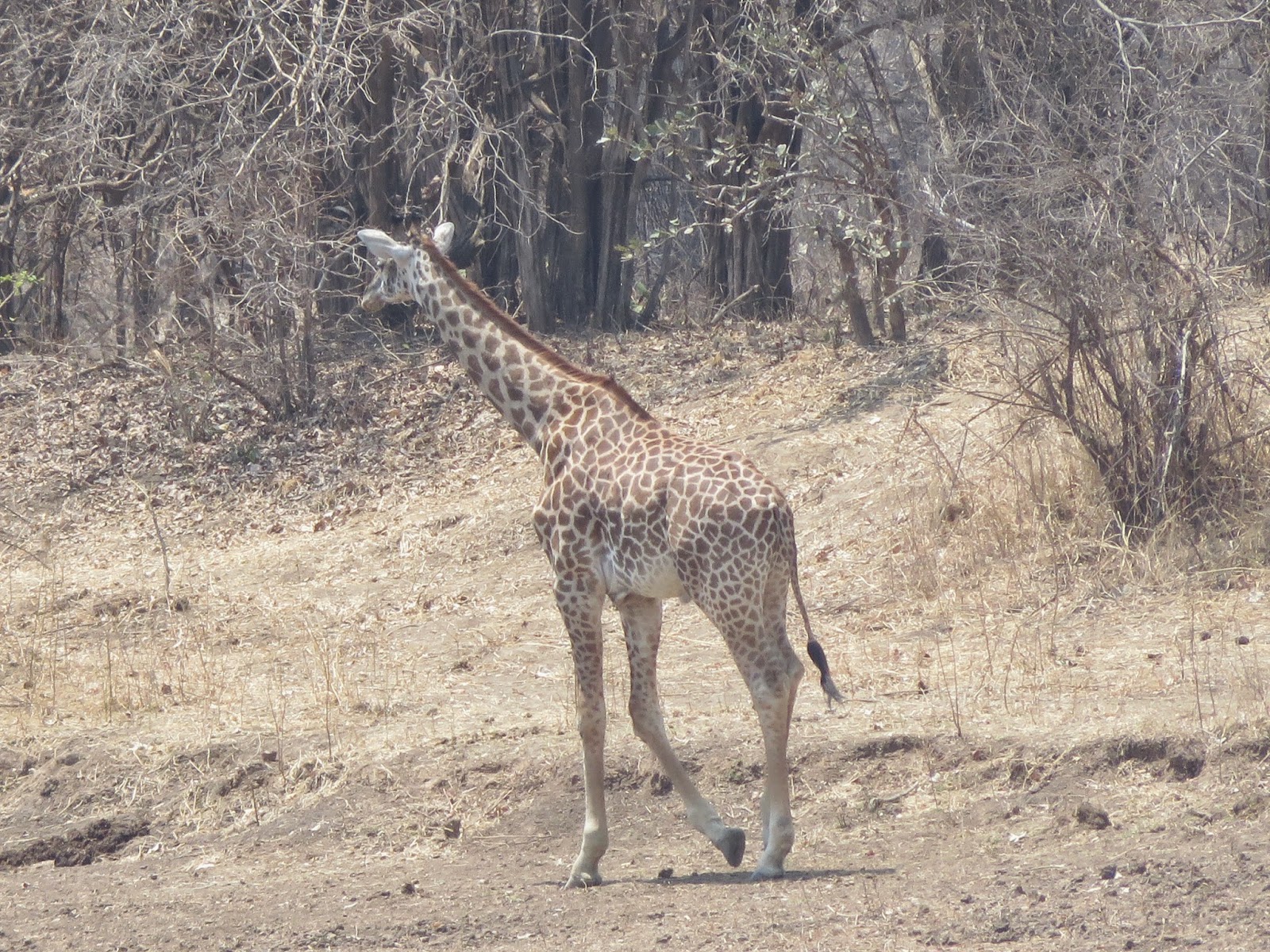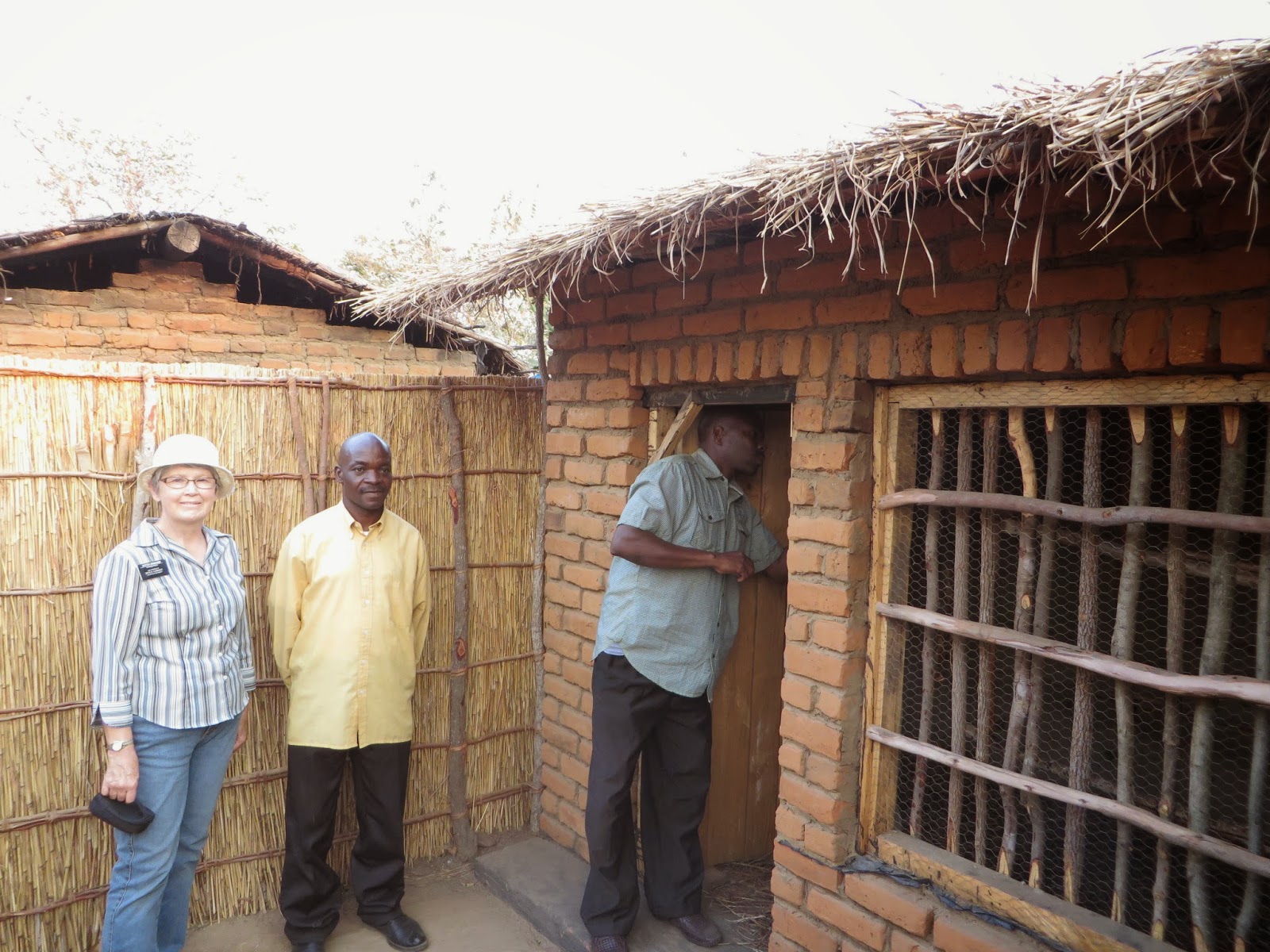We had a fun adventure in September 2014 when we met with all the senior couple missionaries in Chipata for a conference with our mission president, Leif Erickson and his wife, Linda. After the meetings we all traveled into the South Luangwa Game Preserve to spend the night then spend a day driving on a game drive. It was so fun to see all of the animals and to spend time with the other couples.
We all stayed at the Flatdogs Camp and had our choice of a chalet, a deluxe tent, or a regular tent. We thought the regular tent sounded fun. We drove to our campsite and unloaded our luggage, then we had to take our vehicles back out to the parking area to keep from being trampled by the elephants. All food of any kind had to be stored in a secure building because they elephants have a supreme sense of smell and will take anything down to get the goodies. When it was time to go from the dining room to our tent, we had to be escorted by armed guards with flashlights. Actually, their flashlights (aka torches) were pretty sorry. They gave off little light and they really liked my mini maglight. They were trying to barter me out of my "torch" but I wasn't going to let it go. We were across the river from the reserve but that didn't stop the animals from visiting!
The tents had two zippers - one for the front door and one going out into the bathroom area. It was kind of cool with the bamboo fence around the back of the tent and that is where our shower and bathroom was. The weather is usually nice so open-air is great!
Stan shows off the shower. Very rustic but nice. We had twin beds with lamps and fresh water in our tent.
The couples carpooled into the game park to save on fees and it is more fun to go together. We were riding with President and Sister Erickson. The guards told us there was a pride of lions who had made a kill and having a feast. Of course, that is where we went first. We found the lions and there definitely was a "pecking" order. A Cape Buffalo was the unfortunate victim and the feast was on. The lions ate and ate until they could hold no more.
As we stopped and watched the lions feeding on the buffalo, Sister Erickson and I opened our windows and sat on the window ledge to get better pictures. We didn't even see the lions behind us. Thankfully they were so full that we weren't even interesting to them.
The vultures just patiently waited for their turn for lunch. The crocodiles were next in line and there were quite a few waiting but the biggest ones got the first bites, after the lions were full.
The crocodiles are so creepy and just made the hair on my arms stand up. I wouldn't want to get anywhere close to those monsters. When the big one got a piece of meat, he slid back into the water and immediately another one grabbed onto the meat. They rolled and rolled in the water. Crocs legs are short and they don't have hands to pull it apart so another one has to grab on and they have a tug of war to split the meat up to be able to get it small enough to eat. It was a pretty exciting experience. The rangers just let "nature take its course" and don't interfere with the animals and nature.
One of our favorites were the zebra. They are so fascinating and no two are marked alike. We loved watching these lovely animals.
The elephants are such amazing animals and we just loved watching them and spent quite a bit of time watching them.
The giraffe are such regal looking animals. We read that they have high-blood pressure with such a long neck and the blood has to pump so far. They didn't seem to mind us at all.
We caught this mother and her baby crossing the road and quickly got our cameras snapping.
The storks are such huge birds and they are much like the vultures and feed on carrion. They are fun to watch though.
We stopped with Reynolds to take a moment to watch the birds out on the lake.
These little beady eyes look like rocks in the lake but we just kept watching and then we could realize it was a group of hippos trying to keep cool and moist. They stay immersed most of the time during the day when it is hot, then come out at night to feed on grass.
The hippos are such funny looking animals and they grunt and snort all night long. They were even walking through our camp during the night and they just sound like big, fat, noisy pigs. They were fun to watch but we stayed out of their way!
This one was keeping cool by wallowing in a mud hole. We caught his picture as he came out of the mud bath.
Wart hogs are funny animals. Actually, they are quite shy and to get a picture one has to be sneaky and quick.
This little monkey was intimidated by the wart hogs one little bit.
This giraffe was huge but so regal looking. We loved the giraffes and watching his spots and the varying colors of yellow and orange on his body.
This majestic bird is a fishing eagle and it was a big one. He was just taking a break and it was a treat for us to watch him.
Doing what comes naturally -- I can reach those tall leaves in the top!
We loved the elephants but they can be so destructive. This tree right in front of our tent had been knocked down and eaten by the elephants. The elephants were all around our tent but they didn't bother us.
These two decided to make a run right through the parking lot. A couple of our vehicles narrowly missed damage as those big guys didn't care what was in their way, they just went anyway!
The top looks better to me! This old boy was really reaching for the top.
This mother monkey was carrying her baby on her back but then she stopped when she saw us. The baby got scared and slid around to the front of his mother and just hugged her tight. Made me think of a little child cuddling up to his mother for comfort. Was pretty cute;.
We never tire of seeing the baobab trees. They are huge and are hundreds of years old. The story is that when they were thrown out of the heavens, they landed upside down, hence, the effect that it looks like a carrot upside down. They trunk is more fibrous than like a regular tree trunk but they are quite a sight. They are even more majestic when they have their leaves and blossoms on them.
We all stopped for a lunch break. Everyone just contributed a few snacks and had a nice lunch to hold us until we got back to our camp in the evening. We have such a fun group of senior couples and it is so much fun to share their friendship and camaraderie.


































































